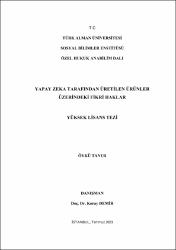| dc.contributor.author | Taner, Öykü | |
| dc.date.accessioned | 2024-03-14T14:05:47Z | |
| dc.date.available | 2024-03-14T14:05:47Z | |
| dc.date.issued | 2023 | en_US |
| dc.date.submitted | 2023-09-01 | |
| dc.identifier.citation | Taner, Öykü (2023). Yapay zeka tarafından üretilen ürünler üzerindeki fikri haklar. Türk-Alman Üniversitesi, Sosyal Bilimler Enstitüsü, İstanbul. | en_US |
| dc.identifier.uri | https://hdl.handle.net/20.500.12846/791 | |
| dc.description.abstract | People live in the world of technology that is constantly changing and transforming
forward. This situation causes robots that act like humans and can exceed humans in
capacity in the future, taking up more space in human life day by day. In this period,
where artificial intelligence systems, which constitute the infrastructure of robots, are
developing day by day, it is witnessed that artificial intelligence systems also produce
products with the quality of "works". This situation brings with it the problem of whether
the products produced by artificial intelligence systems are in the nature of works and
even whether artificial intelligence systems can have works. However, considering that it
is not possible for each artificial intelligence system to produce works by showing human
characteristics on its own, it should be examined which artificial intelligence systems
produce products by showing human characteristics. For this reason, first of all, artificial
intelligence categories and machine learning principle were examined and artificial
intelligence systems that could produce works were determined. Likewise, the most
important source of producing a work is the ability to transfer someone's personality to
the work. Considering that personality is not a property of a real person and a
characteristic of creative power, it has been examined that artificial intelligence systems
that have been developed until today, have any specialties on their works. Because
although artificial intelligence systems are not real people, they resemble human beings
with their autonomous behaviors and therefore it has been taken into account that they
should have personalities. Because although artificial intelligence systems are not real
people, they resemble human beings with their autonomous behaviors, and therefore, it
has been taken into account that they must have personalities within the scope of liability
law. Even if a personality is attributed to artificial intelligence, it has been examined
whether they can have financial and moral rights. Although it has been evaluated that
artificial intelligence systems may have financial rights, moral rights are strictly personal
rights and arise from the moral relationship between the author and his work. In this
context, it has been concluded that artificial intelligence does not have such a personality. | en_US |
| dc.description.abstract | İnsanlar sürekli ileriye doğru olarak değişen ve dönüşen teknoloji dünyasının içinde
yaşamaktadır. Bu durum insan gibi davranan ve ileride kapasite olarak insanı da
aşabilecek robotların insan hayatında günden güne daha fazla yer kaplamasına sebebiyet
vermektedir. Robotların altyapısını oluşturan yapay zekâ sistemlerinin günden güne
geliştiği bu dönemde yapay zekâ sistemlerinin de “eser” niteliğinde ürün ürettiklerine
şahit olunmaktadır. Bu durum yapay zekâ sistemleri tarafından üretilen ürünlerin eser
niteliğinde olup olmadığı ve hatta yapay zekâ sistemlerinin eser sahibi olup olamayacağı
sorununu beraberinde getirmektedir. Ancak her yapay zekâ sisteminin kendi başına,
insani özellikler göstererek eser üretmelerinin söz konusu olamayacağı düşünülerek hangi
yapay zekâ sistemlerinin insani özellikler göstererek ürün ortaya koydukları
incelenmelidir. Bu sebeple öncelikle yapay zekâ kategorileri ve makine öğrenmesi
prensibi incelenmiş ve eser üretebilecek yapay zekâ sistemleri tespit edilmiştir. Keza eser
üretebilmenin en önemli kaynağı kişinin, hususiyetini esere aktarabilmesidir. Hususiyetin
gerçek kişiye ait bir özellik olmadığı ve yaratıcı gücün varlığı dikkate alınarak günümüze
kadar geliştirilen yapay zekâ sistemlerinin eserleri üzerinde hususiyetlerinin
bulunabileceği incelenmiştir. Keza yapay zekâ sistemleri birer gerçek kişi olmasalar da
otonom davranışları ile insana benzemektedirler ve bu sebeple sorumluluk hukuku
kapsamında birer kişiliklerinin bulunması gerektiği dikkate alınmıştır. Yapay zekâya bir
kişilik atfedilmesi halinde dahi mali ve manevi haklara sahip olup olamayacakları
incelenmiştir. Yapay zekâ sistemlerinin mali haklara sahip olabileceği değerlendirilmiş
olsa da manevi haklar kişiye sıkı sıkıya bağlı haklardan olup eser sahibinin eseri ile
arasındaki manevi ilişkisinden doğmaktadır. Bu kapsamda yapay zekânın bu derece bir
kişiliğinin bulunmadığı kanaatine varılmıştır. | en_US |
| dc.language.iso | tur | en_US |
| dc.publisher | Türk-Alman Üniversitesi Sosyal Bilimler Enstitüsü | en_US |
| dc.rights | info:eu-repo/semantics/openAccess | en_US |
| dc.subject | Yapay zekâ | en_US |
| dc.subject | Eser | en_US |
| dc.subject | Eser sahibi | en_US |
| dc.subject | Hususiyet | en_US |
| dc.subject | Fikri mülkiyet hukuku | en_US |
| dc.subject | Artificial intelligence | en_US |
| dc.subject | Work | en_US |
| dc.subject | Author | en_US |
| dc.subject | Property | en_US |
| dc.subject | Intellectual property law | en_US |
| dc.title | Yapay zeka tarafından üretilen ürünler üzerindeki fikri haklar | en_US |
| dc.type | masterThesis | en_US |
| dc.relation.publicationcategory | Tez | en_US |
| dc.contributor.department | TAÜ, Sosyal Bilimler Enstitüsü, Özel Hukuk Ana Bilim Dalı Koleksiyonu | en_US |

















